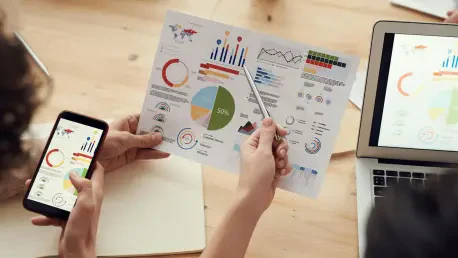Introduction
In today’s fast-paced B2B landscape, marketing teams face mounting pressure to deliver high-impact campaigns with shrinking timelines and limited resources, often juggling multiple channels while striving to maintain a cohesive brand voice across all touchpoints. This challenge is compounded by the sheer volume of repetitive tasks—drafting content, analyzing data, and coordinating workflows—that drain valuable time from strategic planning and creative innovation. As businesses strive to stay competitive, the integration of artificial intelligence (AI) agents offers a transformative solution, promising not just efficiency but a fundamental shift in how marketing teams operate.
This article delves into the specific ways AI agents enhance marketing team productivity, focusing on tangible outcomes rather than mere technological novelty. It explores how these intelligent systems streamline operations, foster better collaboration, and enable marketers to prioritize high-value tasks. Drawing from empirical research and industry insights, the discussion aims to equip B2B decision-makers with actionable understanding of AI’s role in addressing persistent operational bottlenecks. The importance of this topic cannot be overstated: as marketing demands grow more complex, leveraging AI is no longer optional but a strategic imperative for sustaining growth and relevance in a crowded marketplace.
Unlocking Efficiency with AI-Driven Collaboration
AI agents are redefining productivity by automating repetitive and time-intensive tasks that often bog down marketing teams. From drafting initial content pieces to scheduling social media posts, these intelligent systems handle mundane activities with precision, allowing team members to focus on strategy and creativity. A landmark study from the Massachusetts Institute of Technology (MIT) revealed that human-AI hybrid teams achieved a 60% increase in productivity per employee, without any compromise in the quality of deliverables. This significant uplift underscores how AI can act as a force multiplier in high-pressure B2B environments.
Beyond task automation, AI agents enhance collaboration by reducing communication clutter and sharpening focus. The same MIT research highlighted that hybrid teams sent 23% fewer non-essential messages, cutting down on workplace noise and enabling a 23% increase in time spent on core creative tasks like content development and visual design. For B2B marketers managing cross-functional campaigns, this streamlined communication translates to faster decision-making and fewer missteps, ensuring that projects stay on track even under tight deadlines.
Moreover, the compatibility between human team members and AI agents plays a critical role in maximizing these benefits. The MIT study found that pairing conscientious human marketers with open-minded AI personalities resulted in higher-quality outputs, particularly in visual content creation. Conversely, mismatched dynamics led to suboptimal results, signaling the need for thoughtful integration strategies. For businesses, this means treating AI not just as a tool but as a virtual teammate, carefully aligned with team dynamics to drive measurable impact.
Conclusion
Reflecting on the insights shared, it becomes evident that AI agents have reshaped the landscape of marketing productivity by automating routine tasks, enhancing focus, and optimizing team interactions. The journey of integrating these tools into B2B marketing operations, as evidenced by robust data and real-world implications, marks a pivotal shift in tackling longstanding inefficiencies. Looking ahead, the priority for business leaders lies in strategically embedding AI into team structures, ensuring alignment with human strengths. This approach promises not only immediate gains but also positions organizations to adapt to evolving market demands with agility and innovation.









